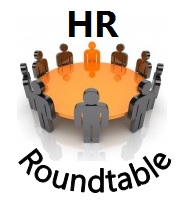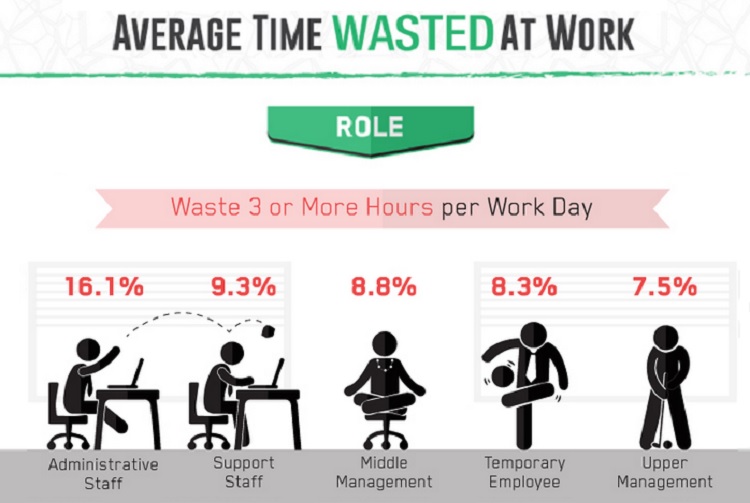The September (Cincinnati) HR Roundtable had a bit of a tongue in cheek topic based on an article from The Wall Street Journal: “How Bosses Waste Their Employees’ Time.” (Click here to check it out. Subscription required.)
To get the discussion going, everyone started with these questions:
- What are current ways that bosses waste other’s time?
- Why isn’t this addressed by HR and/or leadership in organizations?
- How can we become more efficient and waste less time?
Everyone was very eager and wanted to get a chance to jump in and share their experiences. When everyone reconvened they had great feedback to share
1. What are current ways that bosses waste other’s time?
Tradition or the “This is how we’ve done things” approach — The first item that was shared was the barrier that many have heard or experienced first-hand. There are definitely some practices that stand the test of time, but being stuck in the same rut because it’s comfortable for someone isn’t healthy.
Stupid, useless meetings — Wow! This was pointed and received an actual cheer from the group. Having meetings has been burned into the fabric of organizations. At times though it seems that there are several meetings that happen just because that’s how we’re used to gathering. People should be open and vocal about meetings that waste time.
Unclear expectations — This should probably be the number one answer because ambiguity is the bane of effective work. Unfortunately, most employees complain to each other about the lack of clear expectations, but not with their boss. Please note that this behavior happens at every level of an organization.
Useless reports — There’s an old mantra from education that professors are encouraged to “publish or perish.” That same mantra often exists in companies as well. If we get reports that truly waste our time, we tend to ignore them or discard them instead of raising our hand and challenging the existence and purpose of the report.
Not focused on anyone else’s time or schedule but their own — This leads to constant back biting and gossip in companies. Since everyone values how their time is used throughout a day, it would make sense that you’d consider the time/schedule of others. This is especially true for project and/or department meetings. When people are late or even absent from scheduled appointments, it ruins your day.
One-way communication and not knowing what your staff does — This is another example of a boss being primarily self-centered. Any time you have someone who is willing to push communication out, but then doesn’t close the loop, you have a problem. Not knowing what your staff does could be a separate item, but it can easily be paired with one-sided communication. This is because your boss wouldn’t know who you are or what your function is even though they continue to prat on.
More interested in activity than results — When people constantly say how busy they are, they’re focused on activity. This busyness may lead to outcomes, but it most often leads a ton of mindless tasks that lead to nowhere. This is another characteristic that will show up at every level of a company’s structure. It needs to be called out and fixed.
2. Why isn’t this addressed by HR and/or leadership in organizations?
We don’t like context — It’s true. In organizations we’re more concerned with speed and cranking work out than taking time to ask “why” something is done. In fact, we will label people who always ask for context as troublemakers or performance problems. Getting context is essential for interactions to be most effective. It’s not a waste of time. It actually is the best way to use your day!
Disengaged employees — You could make a chicken/egg argument here. Are employees disengaged because bosses are wasting their time? Or, are bosses disengaged themselves and that permeates through their staff? It’s hard to quantify disengagement. However, this shouldn’t be something to keep HR and leadership addressing poor bosses.
It takes time to address this behavior — This answer is saddening. Yes, working with people and their behaviors takes time. That cannot be avoided. If you have an HR function and/or leadership who feels that investing in people is a waste of time, then change companies.
The boulders of control and ego — These two monsters tie the hands of so many because we are hesitant to push against someone’s ego. We tend to try to work around it carefully, but that isn’t an effective approach. Also, the myth of control by a boss is crippling. We need to allow people to perform and not continue to have people who are responsible for leading others who are stuck on themselves.
We avoid high stakes conversations — This was a great point because no one enjoys confrontation. Our minds tend to think the worst possible outcomes will happen when we must have tough conversations. That isn’t the case 99% of the time, but our minds can lead us to fear that is unfounded.
3. How can we become more efficient and waste less time?

Build relationships — Most companies focus on reporting lines and not the relationships between a boss and their staff. As HR pros, we’d be more effective ourselves if we set the stage and environment to have healthy, professional relationships. This is another area where investing your time towards this end is well worth it.
Establish guidelines and clear expectations if you are fortunate to be a “boss” — We can help people succeed in their role as a boss if we develop the framework that allows them to be connected to their people. Having templates and approaches on how to do well will give people more definition and structure to their roles. Having clear expectations will hopefully reduce ambiguity and improve the use of everyone’s time.
Be persistent and consistent — Making sure that people work in healthy, constructive working relationships should be your norm and not your reaction when things go sideways. One of the challenges of this is that you can’t just focus on these relationships once. It’s an on-going factor in an organization’s culture. Being persistent over time is needed in order for people to see healthy supervisor/staff interactions.
Understand that what gets measured gets better — This seems to make all the sense in the world, but it’s rarely practiced. If you step back and evaluate where time could be wasted, come up with some potential approaches/solutions and then measure to see how it’s working. We do this with so many functions within our company during the normal course of work. Let’s start doing it with our time.
Understand that we ALL waste time — In the end, we need to be honest. This isn’t just a boss/employee issue. We all have too many time vacuums in our day. Knowing that this is a “people” thing vs. a reporting relationship thing is good. This allows everyone to step back, breathe, evaluate and then correct those areas that aren’t useful.
This was a great session and people took away a ton of ideas as well as some great stories. I hope we all take steps to be more cognizant of our own use of time and the use of other’s time. It will make us all more productive and effective in what we do.
